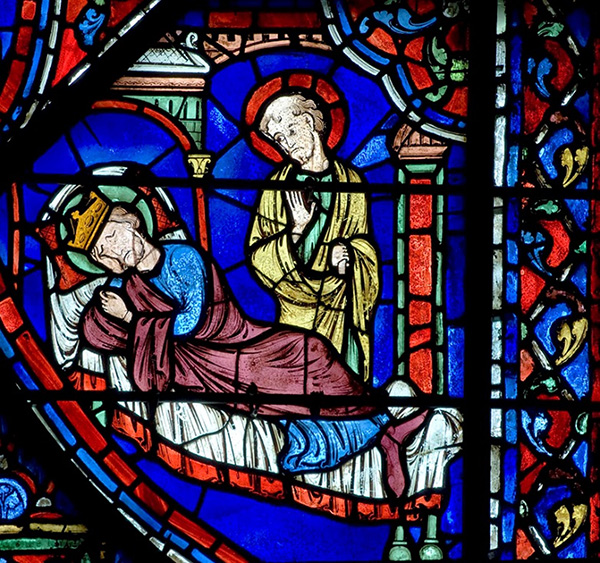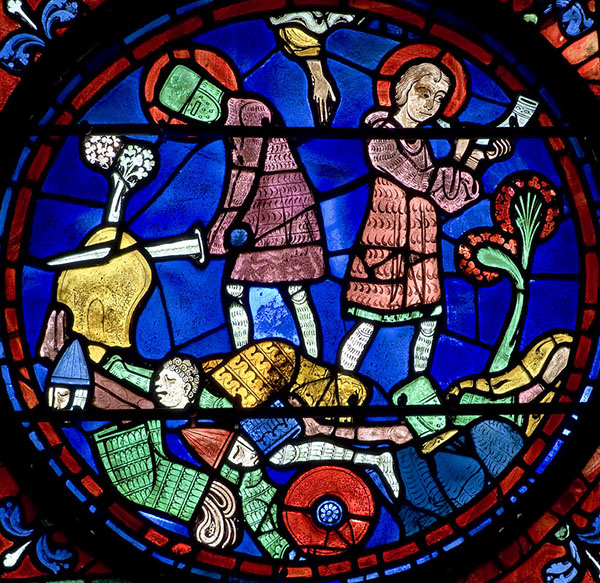In the Chanson de Roland, as presented in the Digby Manuscript 23, the main character is Rollant li marchis, Roland, lord of the march of Brittany, and is depicted as the nephew of Charlemagne. This connection, however, is steeped in literary creation rather than biographical fact, sparking various speculations about the historical accuracy of the characters portrayed in this epic song.
The absence of concrete biographical details and the blending with imaginative elements have led critics and historians to generally question the familial ties between Roland and Emperor Charlemagne. Historical records concerning Pepin the Short—who married Bertrada of Laon between 741 and 745 and fathered eight children, with only Charles, Carloman, and Gisela surviving into adulthood—do not confirm any grandchildren through Carloman, and state that Gisela was placed in a convent. These details suggest that Charlemagne likely had no nephews, contradicting the song’s portrayal.

An intriguing legend from the Vita Karoli Magni complicates this picture: it tells of Gisela and Charlemagne conceiving Roland illicitly, after which Gisela entered a convent. Overwhelmed by guilt, Charlemagne attempted to confess to Saint Gil but was unable to speak of the incident directly. During a mass held by Saint Gil, the Archangel Gabriel reportedly revealed the sin through a message left on the paten, prophesizing Roland's birth and commanding that Gisela marry Milon of Angleris. Following these divine instructions, Charlemagne arranged their marriage and named Milon Duke of Brittany—hence Roland's later title as prefect of the region.
Despite this legend, it remains a contentious issue to definitively deny Roland's status as Charlemagne’s nephew. The murky details about the family lives of Charles Martel and Charlemagne—who had multiple wives and numerous concubines—add layers of complexity. Charles Martel, for instance, fathered at least three known children from various unions, and the detailed marital history of Charlemagne as recorded in the Vita Karoli Magni further obscures the familial lines, making the assertion that Roland could not have been Charlemagne’s nephew, son, or both, almost as speculative as affirming it.
Regardless, the Song of Roland surpasses the historical figure at its center, elevating Roland from an eighth-century Frankish warrior to the embodiment of the ideal eleventh-century knight errant. Roland encapsulates the ideal of the chivalric knight of the eleventh century, distinct from the eighth-century Frankish warriors. He emerges as an epic hero who embodies the physical attributes, moral framework, and societal values of Christian Europe during Turoldus's era. His character is drawn in Homeric dimensions, achieving immortality through the ideals he espouses and the epic narratives that celebrate his life.
Roland's unwavering refusal to negotiate with the Saracens highlights his commitment to a Christian ethos of war as a moral duty, not just a military endeavor. This is vividly illustrated in stanza 79, verses 1,006 to 1,016 of the poem, where Roland, informed by Oliver of the impending Saracen attack at Errozabal, expresses satisfaction at the opportunity to fulfill his Christian duty of struggle, sacrifice, and martyrdom. Such scenes reinforce Roland’s legendary status, elevating him beyond mere historical figure to the epitome of the eleventh-century chevalier, steadfast in his pursuit of ideals that resonate through ages via epic tales.
|
Says Oliver: "Companion, I believe, Sarrazins now in battle must we meet." Answers Rollanz: "God grant us then the fee! For our King's sake well must we quit us here; Man for his lord should suffer great disease, Most bitter cold endure, and burning heat, His hair and skin should offer up at need. Now must we each lay on most hardily, So evil songs never sung of us shall be. Pagans are wrong: Christians are right indeed. Evil example will never come of me."
|
Oliver says, "Friend, I believe we must now meet the Saracens in battle." Rolland replies, "May God grant us victory! We must prove ourselves here for the sake of our King; a man should endure great hardship for his lord, withstand the coldest frost and the burning sun, and sacrifice his blood and sweat as needed. We must all strike with all our might, so that no songs of disgrace will ever be sung about us. The pagans are in the wrong; the Christians are indeed in the right. No one will ever cite me as an example of wrongdoing." |
Oliver is portrayed as Roland's inseparable companion in arms and brother-in-law within the epic narrative of the Song of Roland. The Carolingian chronicles, however, make no mention of Oliver, suggesting that his character is likely a fictional creation of the poet. According to the epic, Roland is depicted as unyielding and stoic, unable to fathom defeat and viewing war as an opportunity for suffering and even self-sacrifice. In contrast, Oliver is characterized as prudent and wise, advocating for strategic victory through seeking assistance from King Charles when overwhelmed by foes. During the battle, Oliver implores Roland three times to sound the oliphant, a call for help Roland stubbornly refuses, determined not to give the infidels the satisfaction of seeing a Christian hero call for aid.

In the epic, Charlemagne is depicted as a venerable warrior of unwavering faith, aged over two centuries, who has engaged in a holy war against the heathens under the guidance of Saint James. Unlike the vigorous Roland, Charlemagne is portrayed as weary of battle and yearning to return to his lands. Similarly, Archbishop Turpin is represented as the epitome of the militant, crusader cleric—a bold, eccentric, and somewhat unhinged figure, despite historical records indicating he likely never left Reims nor participated in such battles. Through these characters, the poet embellishes the narrative with a crusading zeal reflective of the eleventh-century militant Church.
The plot of the Song of Roland is based on historical events but is enriched with epic elements, making it a fascinating study in the divergence between legend and historical reality. This contrast helps to highlight certain aspects that the poet or traditional accounts may have obscured or altered for artistic or historical reasons. Despite the poem’s notable exaggerations—like the treasure of 700 camels laden with gold and silver offered by Blancandrin to secure Charlemagne's trust, or the fantastical depiction of 400,000 Muslims opposing Charlemagne's 20,000-strong rear guard at the Pass of Rencesvals—the narrative is imbued with significant historical insights. These embellishments serve not only to heighten the dramatic effect but also to explore the ideological and cultural milieu of the time.